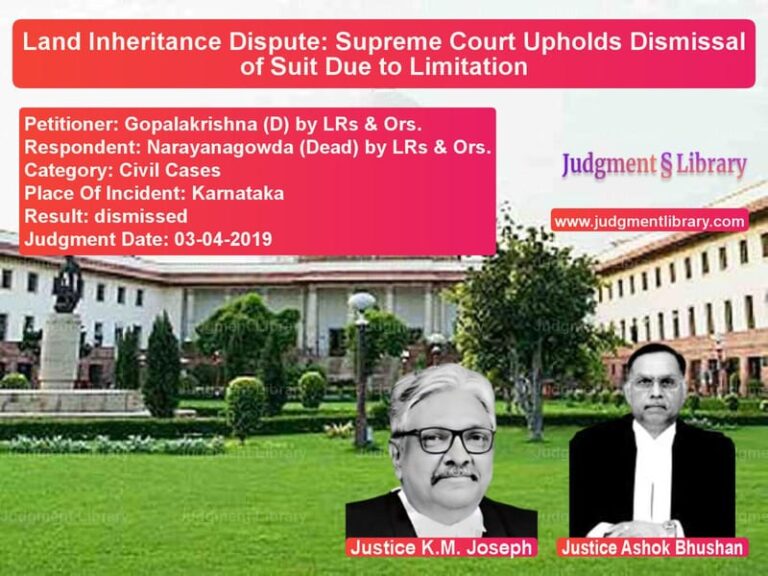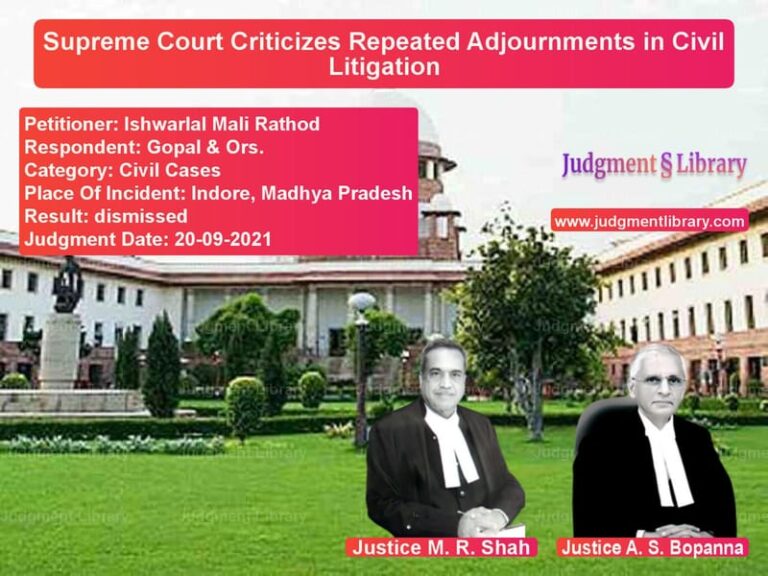Railway Accident Compensation: Supreme Court Clarifies Interest on Compensation Amount
The Supreme Court of India recently ruled in Union of India vs. Radha Yadav, a case concerning compensation for railway accident victims under the Railways Act, 1989. The Court clarified the application of interest on compensation amounts in railway accident claims and addressed concerns about passenger safety in Indian railways.
Background of the Case
The case arose from an incident on October 2, 2003, when Dasarath Yadav, a passenger traveling from Burdwan to Howrah in a local train, peeped out of the compartment door and suffered fatal head injuries after colliding with a post near the railway track.
The Railway Claims Tribunal, Kolkata, dismissed the claim for compensation filed by the deceased’s widow, Radha Yadav, on the grounds that the accident was caused by the passenger’s own negligence. However, the Calcutta High Court reversed this decision, awarding Rs. 8,00,000 along with 9% interest per annum, citing the principle of strict liability under Section 124-A of the Railways Act.
The Union of India challenged the decision before the Supreme Court, arguing that interest should not be awarded on the revised compensation amount.
Key Legal Issues
- Whether railway accident compensation should be determined based on the amount applicable on the date of accident or the date of the award.
- Whether the principle of strict liability applies to railway accidents.
- Whether interest should be awarded on the revised compensation amount.
- The role of Indian Railways in improving passenger safety.
Petitioner’s Arguments (Union of India)
- The compensation amount should be based on the amount applicable on the date of the accident, not the revised amount applicable on the date of the award.
- Interest should not be awarded on the revised compensation amount, as it would unfairly burden the Railways.
- Railways should not be held liable for accidents resulting from passengers’ own negligence.
Respondent’s Arguments (Radha Yadav)
- The Railways were liable under Section 124-A of the Railways Act, which imposes strict liability for accidents.
- The principle of beneficial legislation should apply to maximize compensation for victims.
- Interest should be awarded to compensate for the delay in receiving compensation.
Supreme Court’s Observations
The Supreme Court, comprising Justice Uday Umesh Lalit and Justice Indira Banerjee, referred to the precedent set in Union of India v. Rina Devi (2018) and clarified that compensation should be awarded as follows:
“The amount of compensation payable shall be the amount applicable on the date of the accident with reasonable interest. However, if the revised compensation as on the date of the award is higher, the claimant is entitled to the higher amount.”
The Court emphasized:
- “Interest should be awarded on the compensation applicable on the date of the accident, not on the revised amount.”
- “If the total compensation with interest is less than the revised compensation, then the higher of the two amounts should be awarded.”
The Court further held that the High Court erred in awarding interest on the revised compensation amount. Therefore, the judgment was modified to align with the principles established in Rina Devi.
Railway Safety Concerns
During the proceedings, the amicus curiae, Senior Advocate Brijender Chahar, presented multiple reports highlighting safety deficiencies in Indian Railways:
- The Anil Kakodkar High-Level Safety Review Committee (2012) identified serious safety lapses.
- The Comptroller and Auditor General (CAG) Report (2016) highlighted inefficiencies in suburban train services.
- The Standing Committee on Railways recommended urgent reforms to improve passenger security.
The Additional Solicitor General agreed that these safety concerns required immediate attention, and the Court directed the Railways to implement necessary safety measures.
Final Verdict
The Supreme Court modified the High Court’s judgment as follows:
- Compensation shall be awarded as per the amount applicable on the date of the accident.
- Interest shall be calculated on the compensation amount applicable at that time.
- If the total compensation with interest is less than the revised compensation amount, the higher amount shall be awarded.
- The Railways were directed to improve safety measures to prevent future accidents.
Legal and Social Implications
- The judgment clarifies the calculation of compensation and interest in railway accident cases.
- It reinforces the principle of strict liability, holding Railways accountable for passenger safety.
- It ensures that claimants receive fair compensation without imposing excessive financial burdens on the Railways.
- The ruling mandates urgent safety reforms in Indian Railways.
This case serves as a crucial precedent for railway accident compensation claims, balancing the interests of victims and the Railways while emphasizing the need for improved passenger safety.
Petitioner Name: Union of India.Respondent Name: Radha Yadav.Judgment By: Justice Uday Umesh Lalit, Justice Indira Banerjee.Place Of Incident: Burdwan, West Bengal.Judgment Date: 29-01-2019.
Don’t miss out on the full details! Download the complete judgment in PDF format below and gain valuable insights instantly!
Download Judgment: Union of India vs Radha Yadav Supreme Court of India Judgment Dated 29-01-2019.pdf
Direct Downlaod Judgment: Direct downlaod this Judgment
See all petitions in Compensation Disputes
See all petitions in Negligence Claims
See all petitions in Judgment by Uday Umesh Lalit
See all petitions in Judgment by Indira Banerjee
See all petitions in allowed
See all petitions in Modified
See all petitions in supreme court of India judgments January 2019
See all petitions in 2019 judgments
See all posts in Accident Cases Category
See all allowed petitions in Accident Cases Category
See all Dismissed petitions in Accident Cases Category
See all partially allowed petitions in Accident Cases Category







